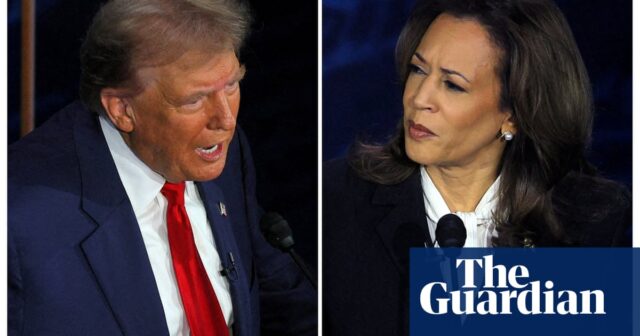Collins dictionary went with “brat”. Oxford chose “brain rot”. But in a brutally divided country, the US’s premier dictionary skipped the slang: Merriam-Webster’s word of the year is “polarization”.
The announcement comes in an election year that put the concept on display, as Kamala Harris warned of fascism under Donald Trump, while Trump resorted to name-calling and claimed his opponent was running on “destruction”. As the dictionary put it, polarization “happens to be one idea that both sides of the political spectrum agree on”.
Merriam-Webster defines polarization as “division into two sharply distinct opposites; especially a state in which the opinions, beliefs, or interests of a group or society no longer range along a continuum but become concentrated at opposing extremes.” In other words, as Peter Sokolowski, the dictionary’s editor-at-large, told the Associated Press, it “means that we are tending toward the extremes rather than toward the center”.
And it’s not just politics that have divided the US – Americans have also dug in their heels over celebrity news – the feud between Kendrick Lamar and Drake, for instance – and sports, as in controversy over the gymnast Jordan Chiles’s bronze medal at the Olympics.
The dictionary’s word-of-the-year selection is based on search traffic, with 100m monthly visits to its website. Google Trends shows a small increase in searches for the word beginning last year, as the election cycle ramped up. “We’ve had dictionaries of English for 420 years and it’s only been in the last 20 years or so that we’ve actually known which words people look up,” Sokolowski told the AP.
But the word has been around since the early 1800s in a scientific context: it was used then to describe light waves, the dictionary notes, before evolving to describe politics and culture. It originates from the Latin polaris, referring to the planet’s poles.
One thing that’s not polarized: use of the word itself. It’s familiar, for instance, on MSNBC, CNN and Fox News. “In a little bit of an ironic twist to the word, it’s something that actually everyone agrees on,” Sokolowski said.
Polarization wasn’t the only word that stood out at Merriam-Webster this year. Other word-of-the-year contenders included “demure”, popularized by the TikToker Jools Lebron in August to (satirically) describe appropriate decorum in a given situation. Also in the cultural sphere, there was “fortnight”, the name of a Taylor Swift song that describes a two-week relationship (Americans are perhaps less familiar with the word, rarely used here, than Brits are). In the world of science, there was “totality”, describing the path of the moon across the sun during the total solar eclipse in April. “Allision”, meanwhile, was of interest after the Baltimore bridge collapse in March; the dictionary defines it as “the act or an instance of a ship striking a stationary object”.
Two others also related to politics: there was “pander”, describing politicians’ performative behavior to win over a crowd; and “democracy”, searched in red and blue states before an election in which the system’s fate was a focal point. That, incidentally, was also Merriam-Webster’s first word of the year, in 2003, and it remains among its most popular searches, Solokowski told the AP.
“There’s a poignancy to that, that people are checking up on it,” he said. “Maybe the most hopeful thing that the curiosity of the public shows is that they’re paying attention.”
The Associated Press contributed reporting






